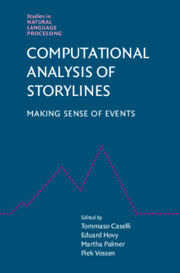Book contents
- Frontmatter
- Contents
- List of Contributors
- Introduction and Overview
- Part One Foundational Components of Storylines
- 1 The Role of Event-Based Representations and Reasoning in Language
- 2 The Rich Event Ontology: Ontological Hub for Event Representations
- 3 Decomposing Events and Storylines
- 4 Extracting and Aligning Timelines
- 5 Event Causality
- 6 A Narratology-Based Framework for Storyline Extraction
- Part Two Connecting the Dots: Resources, Tools, and Representations
- Author Index
6 - A Narratology-Based Framework for Storyline Extraction
from Part One - Foundational Components of Storylines
Published online by Cambridge University Press: 06 November 2021
- Frontmatter
- Contents
- List of Contributors
- Introduction and Overview
- Part One Foundational Components of Storylines
- 1 The Role of Event-Based Representations and Reasoning in Language
- 2 The Rich Event Ontology: Ontological Hub for Event Representations
- 3 Decomposing Events and Storylines
- 4 Extracting and Aligning Timelines
- 5 Event Causality
- 6 A Narratology-Based Framework for Storyline Extraction
- Part Two Connecting the Dots: Resources, Tools, and Representations
- Author Index
Summary
Stories are a pervasive phenomenon of human life. They also represent a cognitive tool to understand and make sense of the world and of its happenings. In this contribution we describe a narratology-based framework for modeling stories as a combination of different data structures and to automatically extract them from news articles. We introduce a distinction among three data structures (timelines, causelines, and storylines) that capture different narratological dimensions, respectively chronological ordering, causal connections, and plot structure. We developed the Circumstantial Event Ontology (CEO) for modeling (implicit) circumstantial relations as well as explicit causal relations and create two benchmark corpora: ECB+/CEO, for causelines, and the Event Storyline Corpus (ESC), for storylines. To test our framework and the difficulty in automatically extract causelines and storylines, we develop a series of reasonable baseline systems
- Type
- Chapter
- Information
- Computational Analysis of StorylinesMaking Sense of Events, pp. 125 - 142Publisher: Cambridge University PressPrint publication year: 2021
- 1
- Cited by



